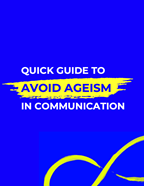Ageism
Age is one of the first things we notice about other people. However, age is often used to categorize and divide people in ways that lead to harm, disadvantage and injustice and erode solidarity across generations. This is ageism: the stereotypes (how we think), prejudice (how we feel) and discrimination (how we act) towards others or ourselves based on age.
Ageism is pervasive, affects people of all ages from childhood onwards and has serious and far-reaching consequences for people’s health, well-being and human rights. Ageism can be found within institutions, in interactions between people and within ourselves. Globally, 1 in 2 people are ageist against older people and in Europe, younger people report more perceived ageism than other age groups.
Ageism remains largely invisible despite its wide reach and negative impact on individuals and society. However, it can be combated: policies and laws, educational activities and intergenerational interventions have all been proven to work to reduce ageism. To create a world for all ages, stakeholders across countries, sectors and disciplines must invest in these three strategies, support further research and data collection in this area and join the global movement to change negative narratives around age and ageing.
Ageism has far-reaching impacts on all aspects of our health and well-being when we are older:
- It is associated with earlier death.
- It is linked to poorer physical health, affecting, among others, our ability to recover from disability and our sexual and reproductive health.
- It increases risky health behaviours (e.g., eating an unhealthy diet, smoking).
- It is associated with poorer mental health, including the onset of depression, increases in depressive symptoms over time and lifetime depression.
- It is associated with a lower quality of life and contributes to social isolation and loneliness.
Ageism also takes a heavy economic toll on individuals and society and exacerbates other forms of disadvantage. More research is required to better understand both the impact that ageism has in earlier stages of life and cumulatively over the life-course.
WHO has been requested by its 194 Member States to work across sectors and stakeholder groups to establish a Global Campaign to Combat Ageism.
The Campaign envisions a world for all ages and aims to turn this vision into reality by changing how we all think, feel and act towards age and ageing. To do so, WHO works together with key partners to:
- generate an evidence base on ageism to better understand what ageism is, why it matters and how we can address it;
- build a global coalition to coordinate efforts to prevent and respond to ageism, improve data collection and enable sharing of knowledge in this area of work; and
- deliver and develop awareness raising events, capacity building programmes and tools to enable others to spread the word about ageism and challenge it when they encounter it.








-for-health.tmb-549v.jpg?Culture=en&sfvrsn=8f7f1dde_1)


